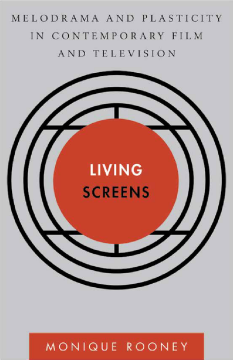
Additional Information
Book Details
Abstract
Through original analysis of three contemporary, auteur-directed melodramas (Matthew Weiner’s Mad Men, Lars von Trier’s Melancholia and Todd Haynes’s Mildred Pierce), Living Screens reconceives and renovates the terms in which melodrama has been understood. Returning to Jean-Jacques Rousseau’s foundational, Enlightenment-era melodrama Pygmalion with its revival of an old story about sculpted objects that spring to life, it contends that this early production prefigures the structure of contemporary melodramas and serves as a model for the way we interact with media today. Melodrama is conceptualized as a “plastic” form with the capacity to mould and be moulded and that speaks to fundamental processes of mediation.
Living Screens evokes the thrills, anxieties, and uncertainties accompanying our attachment to technologies that are close-at-hand yet have far-reaching effects. In doing so, it explores the plasticity of our current situation, in which we live with screens that melodramatically touch our lives.
In a series of incisive readings, Monique Rooney does wonders with and for the genre of melodrama. Her formidable articulation of formal matters on the scene and historical forces behind the scenes is altogether exemplary. The focus on music—putting the “melo” back in melodrama—is nothing short of revelatory and worth the price of admission. On the far side of her informed analyses we are in a much better position to understand the texture even of works not necessarily thought of as melodrama, such as the now legendary Mad Men. We also understand how and why these works move us, with or in excess of our wishes. Highly recommended for any student of the genre or any of her blockbuster examples.
Ian Balfour, Professor of English, York University
Think of metamophoses that cannot consent to be apprehended only as reformations of the same shape, but as sudden ruptures. Think of ruptures that reveal the radical overturning of the logic of reformation itself. Think of unstable essences. Think of an ontological versatility. You will then discover the melodramatic power of transposition. Between Rousseau and McLuhan, Rooney presents here a series of brilliant readings that explore the surprising capacity of all media to transpose "old into new form". Her book is a stunningly beautiful speaking sculpture.
Catherine Malabou, Professor of Modern European Philosophy, Kingston University, UK
Monique Rooney is a lecturer in the English Program, School of Literature, Languages and Linguistics at the Australian National University.
Bold, imaginative and beautifully written, this is a book about the pleasure and thrills of the screen world that is as pleasurable and thrilling to read as the transformative arenas conjured through the flickering film and television images.
Maria Delgado, Times Higher Education
Living Screens is a bold, exciting book. Through meticulous close readings of Weiner’s Mad Men, Lars von Trier’s Melancholia, and Todd Haynes’s Mildred Pierce, Rooney aligns the living screens of the twenty-first century – cinematic, televisual, and digital – with Rousseau’s invention of melodrama in the late eighteenth century, another period of rapid and far-reaching media change. Offering radically new perspectives on melodrama’s history and its revitalisation in long form television shows such as Mad Men, Living Screens is memorably evocative, showing how, in certain hands, interdisciplinarity can sculpt, speak, and sing.
Gillian Russell, Gerry Higgins Professor of Irish Studies, University of Melbourne
